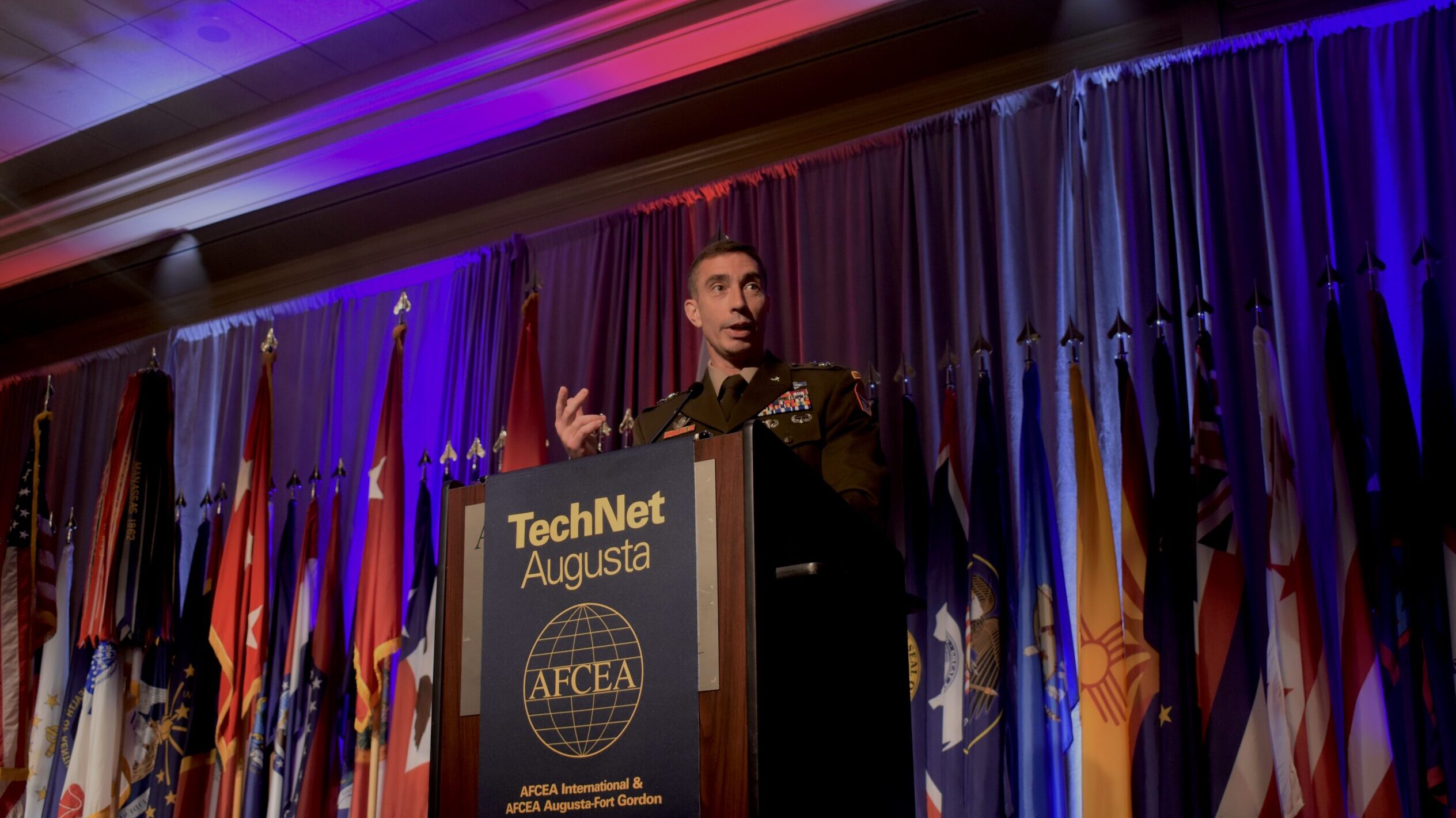JASPREET GILL

AFCEA AUGUSTA 2023 — Army cyber leaders want to harness the potential of artificial intelligence for a role in future operations, but are trying to balance excitement about the capabilities with caution not to get hopes up on how soon it can make a real difference.
Speaking to reporters Aug. 17 at the AFCEA TechNet Augusta conference, officials said the service is actively exploring ways AI can be used in offensive operations against its networks, while service coders are looking at how it can also benefit them.
“But we’re not developing someone that understands how to write code — what we are developing is someone that understands that artificial intelligence is predicated on the aggregation of a lot of data,” Maj. Gen. Paul Stanton, commander of the Cyber Center of Excellence (CCoE), said.
“And so, separately, within our cyber workforce and specifically coordination with Army Cyber Command, we’re thinking a lot about what does it mean to develop confidence and an externally derived dataset upon which an AI algorithm is run,” he added. “So if I’m pulling in data from lots of different places, what degree of confidence do I have in individual data set that I didn’t generate?”
The CCoE is currently running a pilot program with Army Futures Command on how large language models can support doctrine-based research, he added.
“So if a soldier wants to ask a ChatGPT-like question that says, you know, ‘How do I execute a doctrinally correct wet gap crossing?,’ then you would get back an answer, because the large language model had surveyed all of our doctrine in order to support an informed response,” he said. “We’re in the early stages of it. But my point is we’re not sitting on the sidelines and watching, we’re diving in.”
He said that at least one member of every center of excellence has been tasked by Lt. Gen. Milford Beagle from the Combined Arms Center to attend a week-long course on data literacy, which includes an “exposure” to AI. “Again, they’re not going to write code, but they’re going to develop this understanding of baseline how artificial intelligence works,” Stanton added.
But the service wants to make sure it doesn’t get ahead of itself by just how quickly emerging technologies like AI can make a difference, according to Todd Boudreau, cyber school deputy commandant.
“What we often do, however, is we overestimate a capability and how it’s going to change things in the three-to-five year kind of period,” he said. “But in doing so, we underestimate what it’s going to do 10 to 15 years from now. And so understanding where artificial intelligence is, machine learning…as more and more communities begin to use that, and we start to learn, I think it remains important.”
The Army is also exploring how an AI “bill of materials,” or AI BOM, can help the service “catch up” to China in the AI race. Earlier in the week, Young Bang tasked industry at the conference with developing an AI BOM for the service as it looks at increasing its adoption of third-party algorithms.
Meanwhile, the Army also wants to make sure it’s prepared to fight in a future battlefield that will be dominated by electronic warfare. Stanton told reporters that “every soldier” in the service “has to understand the impacts of EW.”
To that point, the CCoE is currently running a pilot program with the Maneuver Center of Excellence and infantry and armor school to expose “students to the effects of jamming, to the effects of geolocation through the [electromagnetic spectrum], while they’re in school.”
The intent is to build it out into the professional education for the entire Army, he added, and the plan is to extend the pilot to other centers of excellence in the future. Boudreau said the “big pivot” now is in conducting counter EW measures and emissions control.
“What we’ve noticed from our own lessons learned from CTC rotations or observations in the world right now is that if an organization, if a unit, is experiencing an electromagnetic attack, that means the adversary has identified you, they have located you, they have targeted you and they’ve chose to irradiate you, they could have just as well chosen to eradicate you,” he said.
No comments:
Post a Comment